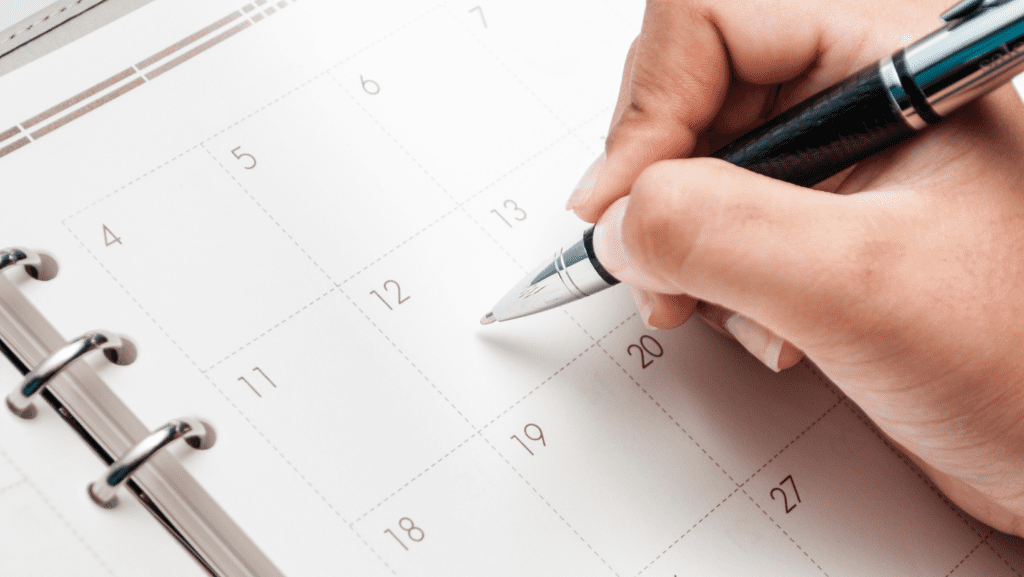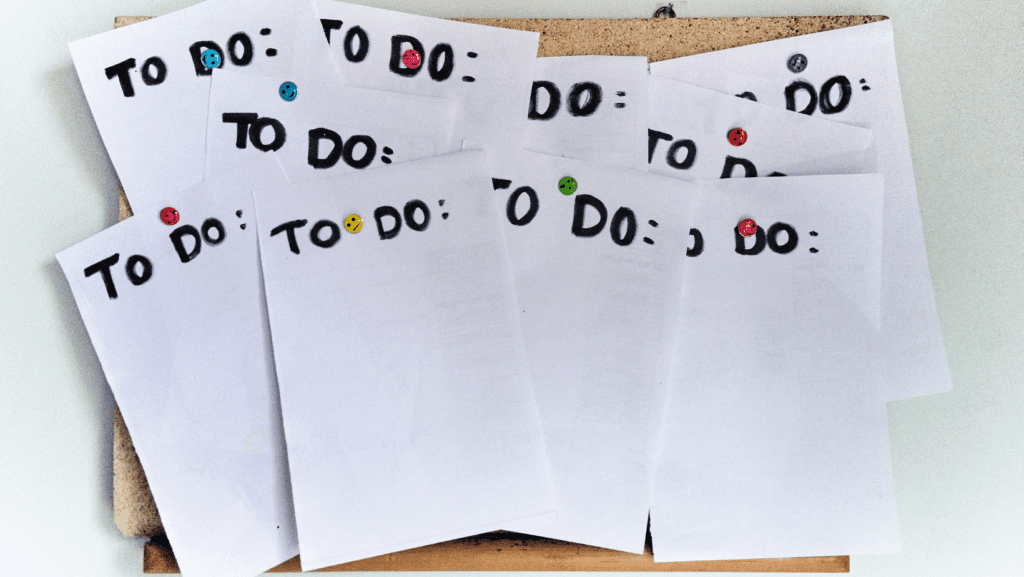
This post may contain affiliate links. For more information, read the full disclosure here.
Are you feeling overwhelmed and swamped by the chaos of your daily life? In just one week, you can organize your entire world with these simple steps.
Ready to find out how to organize your life in one week? First, take a deep breath, and let’s get started.
According to recent research data, incorporating daily habits such as making a realistic to-do list and decluttering your space can significantly increase productivity and reduce stress levels.
Trust me; I have tried these tips myself, and they work wonders! At the bottom of this post, I’ve included a 7-day guide that I followed myself, and you can follow too. Click here to jump right to that section if you want to skip the explanation behind it all.
By the end of the week, you’ll feel like a new person with newfound clarity and focus. So let’s dive in together and conquer the chaos!
The Benefits Of Organizing Your Life in One Week
Do you ever feel overwhelmed by the never-ending list of tasks you need to complete? Well, you’re not alone. Many people struggle with time management and organization in their daily lives.
However, organizing your life in just one week can lead to massive results, including reduced stress and improved productivity.
One of the main benefits of organizing your life in one week is the elimination of that dreaded feeling of being overwhelmed. When we face larger tasks head-on instead of ignoring or procrastinating, it can be incredibly freeing.
Furthermore, tackling your master list and task list for things that need organization allows you to focus on building good habits that will support lasting changes in your home life.
Another significant advantage is having more free time for activities you enjoy. By effectively utilizing time management tips and robust organizational skills, you can find yourself with extra hours every week to devote to hobbies or simply relax.
Review And Change The 7 Parts Of Your Life

Tackling Important Tasks for a More Efficient Home Life
Organizing your life involves addressing various aspects such as meal prep, financial management, document storage, housekeeping routines, shopping lists and schedules, family communication systems, mental health practices, and daily routines.
By improving these areas through goal setting strategies and other organizational methods, we allow ourselves more efficient home lives. For example:
- Meal prepping ahead helps ensure healthier food options are available always
- Paying bills on time saves money by avoiding late fees
- Keeping important documents centralized prevents losing critical information
- Regularly decluttering minimizes items collecting dust and taking up valuable space
These changes may seem minor individually, but aggregating them produces noticeable improvements paving the way toward a more organized lifestyle.
Strategies for Prioritizing and Managing Tasks
Effective task prioritization helps ensure essential tasks receive attention while less important ones get deferred accordingly. Here are some suggestions to help you prioritize tasks:
- Make a to-do list and rank tasks based on importance
- Identify what’s important and urgent
- Connect tasks with core values and big goals
- Avoid unnecessary tasks and set realistic goals
- Develop daily habits that support achieving your goals
- Use a calendar to schedule important tasks
By implementing these strategies, you can better manage your workload while also staying focused on what truly matters.
Implementing Good Habits and Routines
Establishing regular routines helps promote long-term success by maintaining consistency in our actions. By forming habits such as daily routine planning, morning routines, or personal self-care practices, you create structure in your life that supports the ongoing organization.
Take decluttering, for example. Maintaining an organized living space becomes considerably more manageable if you tidy up regularly rather than allowing messes to accumulate into an overwhelming mess.
Utilizing Technology And Tools For Time Management
In today’s modern world, technology offers numerous solutions to help us stay organized. From calendar apps to task management tools, there are countless options designed explicitly for enhancing productivity through organization.
Some popular choices include time-blocking techniques with Google Calendar or utilizing applications like Trello or Todoist for managing task lists.
These resources offer visual representations of our schedules, helping us stay accountable while also providing reminders to ensure essential commitments never slip through the cracks.
Reducing Stress Through Mental Health Practices
Organizing your life extends beyond just physical spaces; it includes mental health too. Implement self-care practices like meditation, journaling, or engaging in hobbies that bring joy which helps reduce stress allowing us to better focus on the task at hand.
Additionally, consider writing down positive affirmations or using habit formation guidelines to help break cycles of procrastination and maintain motivation, ultimately supporting overall mental well-being and productivity.
Prioritizing Free Time: Do What You Love
A significant aspect of organizing your life is identifying activities that genuinely bring happiness and actively prioritizing them within your schedule.
By practicing effective time management, you will create more free time to engage in those activities providing a much-needed balance between work, personal life, and leisure pursuits.
Optimizing Environment To Support An Organized Lifestyle
Lastly, creating an environment conducive to organization is essential. Simple changes such as designated storage spaces for specific items or implementing decluttering methods can make a lasting difference in maintaining an organized home.
To sum up, organizing your life in just one week can lead to massive results by reducing stress, improving productivity, creating more free time for enjoyable activities, and promoting better mental health.
Through task prioritization strategies, habit formation guidelines and efficient time management tips combined with utilizing modern technology tools, you can achieve long-lasting success in organizing all aspects of your life.

How to Organize Your Life in One Week: My 7-Day Success Plan
Do you ever feel like your life is spinning out of control? I know; I’ve been there too. We’re all trying to juggle work, personal life, and everything else in between. Sometimes, all it takes is one week to completely turn things around.
In this guide, I’ll share my tips on how to organize your life in one week so you can regain control and find harmony in your day-to-day living.
The key to organizing your life lies in breaking down the process into clear, manageable steps. I’ll help you identify the main areas that need decluttering, develop a foolproof plan, and provide essential tips to ensure your success.
Remember, a successful organization isn’t just about cleaning your living space; it’s also about organizing your time and streamlining your goals.
Throughout my journey, I’ve discovered that it doesn’t take a major life overhaul to see significant results. In just one week, you can transition from chaos to calm and improve your overall well-being. So, if you’re ready to discover how to organize your life in one week (or even faster), let’s dive right in!
Day 1: Declutter Your Physical Space
On day one of my journey to organize my life in one week, I tackled decluttering my physical space.
Like many people, I’ve discovered that having a clutter-free environment is the foundation for a well-organized life.
With a clear and clutter-free space, it’s easier to concentrate on other aspects of organizing, like schedules and routines.
To start, I followed these simple steps to declutter my surroundings:
- Sorting items: I separated belongings into categories like clothes, books, and miscellaneous items. This made it easier to assess what was essential and what could be let go.
- Deciding what stays: I used the trusty “keep, donate, or discard” rule. If an item wasn’t useful, loved, or needed, it was time to say goodbye.
- Organize and store: For the items that made the cut, I found appropriate storage solutions to keep them organized.
- Maintaining: I set up a system to prevent future clutter, making a conscious effort to put things back in their designated spots after using them.
Throughout the decluttering process, it’s essential to be patient and realistic. Rome wasn’t built in a day, so don’t expect your space to be transformed instantly. It takes time, but the results are worth it.
The benefits of having an organized living space are undeniable. It makes it easier not only to find items when needed but it also reduces stress and improves focus.
In fact, a study by the Princeton University Neuroscience Institute found that a cluttered environment restricts the brain’s ability to process information.
While decluttering, I found that the psychological benefits were just as important as the functional ones.
Seeing my living space become less cluttered and more organized gave me a sense of accomplishment, empowering me to tackle the rest of the tasks necessary to organize my life in one week.
So, if you’re wondering how to organize your life, start by decluttering your physical space. The benefits are worth the investment of time, and it sets the stage for a more organized lifestyle in other areas, too. As they say, a clean home is a happy home—and it’s the first step to a more organized life.
Day 2: Create A Daily Routine
Now that we’ve tackled decluttering the physical space on Day 1, it’s time to organize our daily lives. On Day 2, I’ll show you how to create a daily routine to help organize your life in one week.
A well-planned daily routine can provide structure and increase your productivity. The first step to creating a successful routine is to determine which tasks need to be done on a daily basis. These tasks may include:
- Getting ready for work or school
- Eating meals
- Exercising
- Working
- Personal interests or hobbies
- Household chores
- Spending time with friends or family
Once you’ve identified the essential tasks, arrange them in a logical sequence to create a smooth flow throughout your day. It’s important to allocate time for each task according to your personal preferences and energy levels. For example:
| Time | Task |
|---|---|
| 6:00 AM | Morning routine |
| 7:00 AM | Exercise |
| 8:00 AM | Breakfast |
| 9:00 AM – 5:00 PM | Work |
| 5:30 PM | -Hobby or activity |
| 7:00 PM | Dinner |
| 8:00 PM | Household chores |
| 9:00 PM | Relaxation |
| 10:00 PM | Bedtime routine |
Remember that it’s just as important to schedule time for relaxation and self-care. Taking breaks and enjoying some downtime throughout the day will re-energize you and prevent burnout.
The next step is to adapt your daily routine to your personal preferences and lifestyle. Think about the times when you are most productive, and arrange your tasks accordingly.
For instance, if you’re a morning person, exercise or work on your priority tasks early in the day. On the other hand, night owls might prefer to work on tasks in the evening.
Lastly, it’s crucial to track and adjust your routine as needed. Monitor how well your daily routine works for you, and modify it as necessary to ensure it’s sustainable long-term.
Maybe you find that a morning workout isn’t working for you, but an evening one is. Be flexible and willing to adapt the routine to maintain a balanced and organized life.
By creating a personalized daily routine, not only will you be taking a significant step to organize your life in one week, but you’ll also establish a lasting foundation for an efficient and balanced lifestyle.

Day 3: Tackle Your Digital Clutter
On Day 3 of How to Organize Your Life in One Week, let’s focus on decluttering digital spaces. A clutter-free digital environment can streamline productivity and reduce stress. I’ll share some tips on how to organize your digital life.
First, start by cleaning up your email inbox. Unsubscribe from unwanted newsletters and promotional emails, and create folders or labels to categorize important messages.
This enables quick access and prevents your inbox from becoming overwhelming. To efficiently manage future emails, consider setting up specific times during the day to check and respond to messages.
Next, take control of your files and documents. Whether you use cloud storage or a physical hard drive, create a consistent filing system with folders for specific projects, financial documents, or photos.
Don’t forget to delete any duplicates or unnecessary files in the process. A well-organized digital filing system helps you find documents faster and keeps your workspace clutter-free.
Social media is another way clutter can sneak into your digital life. Take time to:
- Unfollow or mute accounts that don’t align with your interests or goals
- Turn off unnecessary notifications to minimize distractions
- Review privacy settings and update them as needed
After addressing these three key areas, it’s time to clean up your devices. Here’s how to organize your desktop or laptop computer:
- Choose a simple, visually pleasing background image
- Arrange icons into categorized folders
- Avoid using your desktop as a temporary storage for documents
Don’t neglect your smartphone or tablet, either. Give them a thorough cleanup by:
- Deleting unused apps
- Organizing apps into folders or sections
- Moving important app icons onto your home screen for easy access
Wrapping up Day 3, you should now have a better grasp on “how to organize my life” by tackling digital clutter. This is an important step towards maintaining a well-organized life, and it’s one that can make a significant difference in your productivity and mental well-being.
Remember that staying organized is an ongoing process, and routinely assessing your digital spaces will help everything stay in order.
Day 4: Set Realistic Goals
On day four of How to Organize Your Life in One Week, it’s time to set realistic goals. I believe that establishing attainable objectives is crucial for staying organized and making progress in various aspects of life.
From personal growth to professional achievements, having clear goals will help maintain focus and achieve desired results.
The first step in setting realistic goals is to differentiate between short-term and long-term targets. Short-term goals can be accomplished within weeks or months while achieving long-term goals might take years.
By breaking down our objectives into manageable parts, we foster a sense of accomplishment and promote organization in our lives.
For instance, if I want to organize my life better, I can set specific, short-term goals such as:
- Decluttering one room at a time
- Establishing a weekly cleaning routine
- Setting up a monthly budget plan
These short-term goals support my long-term vision of maintaining a well-organized life.
Next, make sure you’re setting SMART goals. For a goal to be SMART, it should be:
- Specific: Well-defined and clear about what you want to achieve
- Measurable: Quantifiable, allowing you to track progress and know when you’ve completed it
- Achievable: Realistic, considering your resources and constraints
- Relevant: Connected to your broader life objectives
- Time-bound: Having a specific time frame for completion
For example, instead of a vague goal like “I want to save money,” a SMART goal would be: “I will save $1,000 in the next six months by cutting back on dining out and entertainment expenses.”
Lastly, create an action plan outlining the necessary steps, resources, and deadlines to ensure success in achieving these goals. By doing this, you’ll have a clear roadmap that will guide you through the process of reaching your goals.
So, as we continue our journey to organize life, remember the importance of setting realistic goals. They’re essential for maintaining structure and achieving your dreams, bringing you one step closer to organizing your life in just one week.
Day 5: Prioritize and Delegate Tasks
When learning how to organize my life in one week, it’s crucial to master the art of prioritizing and delegating tasks. On day 5, I’ll provide some key insights on how to improve these skills, allowing me to create a more balanced and organized life.
Firstly, let me break down the importance of prioritizing tasks. By clearly distinguishing between urgent, important, and less important tasks, I can allocate my time and energy more effectively.
There are various methods to help categorize tasks, such as the Eisenhower Matrix, which sorts tasks into four categories:
- Urgent and important
- Important but not urgent
- Urgent but not important
- Not urgent and not important
An example of this categorization is:
| Urgent | Not Urgent | |
|---|---|---|
| Important | – Emergency situations – Important deadlines | – Long-term projects – Relationship building |
| Not Important | – Interruptions – Some emails and phone calls | – Trivial tasks – Time-wasting activities |
After identifying my tasks in these categories, I’ll focus on meeting the most significant demands. Completing these tasks first will help reduce stress and enhance the flow of my day.
On the other hand, delegation is just as vital when trying to organize life. Delegating tasks means entrusting responsibilities to someone else. It’s an essential skill that helps save time for more critical tasks, promoting collaboration and providing growth opportunities.
Here are some tips to effectively delegate tasks:
- Clearly define the task and expectations for the person responsible.
- Choose the right person for the job based on their skills and expertise.
- Establish deadlines and communicate them clearly.
- Monitor progress and provide guidance as needed.
- Show gratitude and appreciation for the person’s efforts.
By combining prioritization and delegation skills, I can achieve a more organized life and efficiently manage my time. These crucial techniques pave the way for a more productive daily routine, ultimately making a significant impact on how to organize your life in one week.

Day 6-7: Review and Adjust
How to Organize Your Life in One Week comes to a crescendo on days six and seven. These last two days are dedicated to reviewing your progress and making necessary adjustments.
Adjusting your strategies is essential, and I’m going to provide a roadmap on how to organize my life effectively.
First, it’s time to assess the progress made during the week. Here are some key aspects to focus on:
- Goals: Have you achieved or are you on track to achieve the goals set at the beginning of the week?
- Tasks: Were all planned tasks completed, or are there any pending commitments?
- Time management: Did you allocate time effectively, and were the daily schedules feasible?
Taking note of these factors can help in identifying areas for improvement. Based on the findings above, it’s time to adjust the strategies and revise the plans that helped to organize my life.
- For goals, consider the following adjustments:
- If goals were on target, fine-tune them or add new goals for the upcoming week.
- If goals were too ambitious, scale them down to more achievable targets.
- If goals were too easy, ramp them up to challenge yourself.
- For tasks, take these steps:
- Re-evaluate priorities, and ensure that important tasks are completed first.
- Learn to delegate, either to a team at work or family members at home. Sharing responsibilities can ease the burden and increase productivity.
- Introduce a system for tracking tasks, such as a checklist, an app, or a planner.
- Regarding time management, try the following recommendations:
- Fine-tune your daily schedule by allocating time more realistically.
- Consider blocking out specific slots for activities such as exercise, relaxation, and socializing.
- Cut out time-wasting habits or distractions, like extended scrolling on social media.
In the pursuit of learning how to organize life, the focus should always be on self-improvement. Knowing that no plan is perfect and being open to change is crucial for adapting and maintaining organization.
To maximize learning from this journey, consider seeking feedback from peers, colleagues, or family members. Their input could be valuable in finding new perspectives and improving your systems.
So, as you wrap up organizing your life in one week, it’s essential to keep perspective and be ready to adapt your plan. Use days six and seven to review, adjust, and set the stage for a more organized life in the weeks to come.
With consistent updates and improvements, it won’t be long before the question of “how to organize life” becomes a distant memory.
Conclusion: Embrace Lasting Change
By focusing on how to organize your life in one week, you’ll find that achieving lasting change is within your reach. It’s important to remember that organization is an ongoing process, and maintaining your newfound sense of order will require consistent effort.
However, the benefits are well worth it, and you’ll find that you’re better able to manage your time and enjoy a more balanced life.
When reflecting on how to organize my life, I found that the key is to break the process down into manageable tasks. Here’s a summary of the steps you could follow:
- Prioritize your goals and responsibilities
- Create a detailed schedule for each day of the week
- Declutter, organize, and establish organizational systems
- Manage finances and plan for the future
- Develop healthy habits for self-care and continuous improvement
Remember, the goal is to learn how to organize life and embrace change and make it sustainable. Following these steps and consistently revisiting your progress will help you stay on track and continue to grow.
Once you’ve successfully organized your life, it’s important not to become complacent. Check-in regularly and assess what areas may be slipping, and be proactive in addressing them.
Life is full of surprises, and being adaptable will ensure you’re prepared for whatever challenges come your way.
In the end, learning how to organize your life in one week is an excellent starting point. Nevertheless, don’t forget that this journey won’t end after seven days.
By embracing lasting change and committing to continuous improvement, you’ll truly enjoy the benefits of a well-organized life. Happy organizing!
